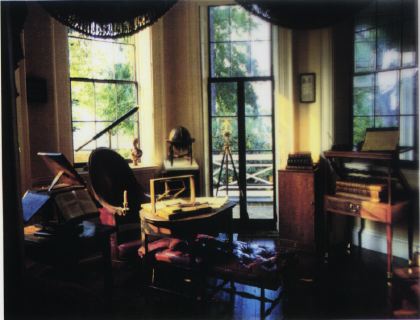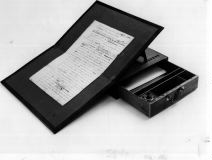
These were working tools for a writer whose legal expertise was foundational to a state government, whose political views were foundational to a nation, and who was active as theorist and experimenter in several scientific communities.
Between l785 and l809, while he was in political office as United States minister to France, then as secretary of state, vice-president, and president for two terms, his writing became more public in its orientation. As a delegate to colonial, state, and continental assemblies, Jefferson's writing necessarily spoke for others as well as himself. As an office holder, his writing necessarily represented institutions of government. His concern for the reception and use of documents grew. To protect information, he devised encryption.
Most important was his belief that good government depended on accurate, accessible information. The technology for accurate copying did not exist, however. Consequently, Jefferson energetically joined efforts to improve copier technology.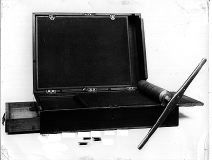
But, of all the copying devices he tried, the polygraph most powerfully demonstrates the link between Jefferson's technological development and his political philosophy. The link is strong, but not obvious. Recognition depends on interpretation, or on taking a view of what the polygraph meant to Jefferson. In my view, the polygraph signified practical democracy to Jefferson. Instrumentation of writing and the preservation of writings was essential to Jeffersonian democracy.
Jeffersonian democracy as a design ethic
Community, people's affinity for others of their kind and the capacity to comprehend diverse viewpoints, is essential for political democracy, Jefferson thought. Writing and reading enable that affinity and comprehension. Thus, it can be said that Jefferson saw writing and reading as communal acts. To improve devices for writing and for preserving writings is to improve the potential for human community. To improve community is to enhance the possibility of political democracy. Democracy is self-governance through deliberation. Mechanisms that support deliberation thus embody an ethic of democracy. This was the design ethic for Jefferson's polygraph.
Jefferson as designer
In the large scholarly and interpretive literature based on his life and work, there are many Jeffersons. Each characterizes a different facet of the man. Here, representing Jefferson as a technician of writing, I conceive 'Jefferson-the-hacker.' (The characterization owes, not to hackers as adept users who break into systems to steal or to damage, but to hackers in the original, honorific sense of expert programmers whose commitments to the freedom of information and ideas are expressed in the design and maintenance of open systems.)Jefferson-the-hacker was an empiricist with democratic ideals. An Enlightenment-trained philosopher and scientist, he was also a highly-skilled, self-taught tinkerer who made tools for drawing, calculating, measuring, farming, writing, copying, and encrypting (Bedini, l984, l990). Committed to disciplined abstraction, he also loved the practical. I attribute him to three separate, contradictory elements in Thomas Jefferson's complicated intellectual universe: 1) rational capacities for conceiving systems; 2) respect for native American culture; and 3) synthesizing tendencies that found a political ideal--free, self-governing community--in eclectic models of governance.
Jefferson's conception of systems (e.g., the earlier listing here of his contributions to the American system of government) is usually attributed to his European Enlightenment-bred rationalism. Less studied are possible native American influences on his thought. Regarding Jefferson and Indians, scholarly attention has focused on how his presidential agenda of land acquisition and national democratization undermined traditional native life.
Nonetheless, Jefferson (for whom science was passion while politics was duty) never stopped pursuing his scientific interest in Indian cultures and institutions. Growing up in western Virginia in the l750s, Jefferson knew neighboring tribes through contact, his own or his surveyor-father's. He continued to supplement this partial knowledge by his own and others' research in native governmental systems, value systems, and languages. He collected artifacts.
His interest in native cultures' relation to the physical environment is explicit in his Notes on the State of Virginia (Jefferson). His recommendations for the University of Virginia called for systematic study of Indian "tradition, laws, customs, languages, and other circumstances" (p. 151). Arguably, therefore, native American cultural practices of relating to a physical world joined the materialism of Lucretius in classical European tradition to inform Jefferson as an empiricist (Matthews, l984; Henri, l986; Weatherford, l988; Lyons et al, l992)
As a maker of writing tools, Jefferson certainly confronted writing's actual materiality. Transcription in his time depended on feather or metal pens with bone or wood handles; on paper made from corn husks, wood shavings, rags, and skins; on inks made from powdered pigments and dyes mixed with water. Weather conditions affected how well any of these substances performed. In short, Jefferson understood writing ecologically, as he suggests in a note to his granddaughter :
"I congratulate you, my dear Cornelia, on having acquired the invaluable art of writing, how delightful to be enabled by it to converse with an absent friend, as if present, to this we are indebted for all of our reading; because it must be written before we can read it. . . .I rejoice that you have learnt to write for another reason; for as this is done with a goose quill, you now know the value of a goose, and of course you will assist Ellen [Cornelia's older sister] in taking care of the half dozen very fine geese which I shall send. . . ." (Bedini, l984, pp. 5-6).Interesting as they were, the material challenges of tool-building did not primarily motivate Jefferson's improvement of writing devices, however. Beyond practical needs, the major motivation came from his political principles, I believe. As a founder of the United States plan of government, Jefferson argued for a democracy reliant on citizen participation and local self-governance. The ideal had eclectic roots in his reading of classical Greek and Roman political philosophy; in French, English, and Scottish Enlightenment rationalist social philosophy; and in his observation of actual social organization in colonial towns and native American villages.
. . . Self-governance proceeds through political deliberation, to Jefferson the highest use of human reason and the engine of government. If a community is to remember its political discourse, extend it, share it, or revise it, a written record is necessary. Original documents must be copied and distributed. Revisions must be communicated. In Jefferson's time, the only recorder and the primary copier was the human hand. Scribal copying had to be mechanized, Jefferson knew, if government was to be accountable to the governed. And that is where the polygraph enters the process.
The Polygraph Story
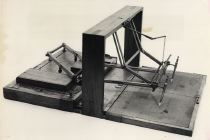 Jefferson's collaboration to develop a version of the polygraph, which Silvio Bedini (l984) describes in Thomas Jefferson and His Copying Machine , was a little like the collaboration to develop the mini-computer that Tracy Kidder (l981) describes in The Soul of a New Machine. Kidder portrays the creation of an intermediate-size computer by a "skunkworks," a highly independent, entrepreneurial unit of system designers and engineers within the Data General Corporation. Characteristically, such teams are comprised of several designer-geniuses loosely held together by their convergent individual agendas and their need for each other's specialized skills.
Jefferson's collaboration to develop a version of the polygraph, which Silvio Bedini (l984) describes in Thomas Jefferson and His Copying Machine , was a little like the collaboration to develop the mini-computer that Tracy Kidder (l981) describes in The Soul of a New Machine. Kidder portrays the creation of an intermediate-size computer by a "skunkworks," a highly independent, entrepreneurial unit of system designers and engineers within the Data General Corporation. Characteristically, such teams are comprised of several designer-geniuses loosely held together by their convergent individual agendas and their need for each other's specialized skills.Although obviously in a different setting, the developers of Jefferson's polygraph worked something like that. The team for Jefferson's polygraph included its designer John Isaac Hawkins (inventor/civil engineer/poet/musical instrument maker/chemist); its manufacturer and marketer Charles Willson Peale (portrait painter/natural history museologist/watchmaker); and its usability-testers Benjamin Henry Latrobe (civil engineer/architect) and Thomas Jefferson (farmer/scientist/architect/politician). In over one hundred letters, Peale, the manufacturer of Hawkins' design for a polygraph, and Jefferson, then president of the United States, corresponded while Peale debugged the device.
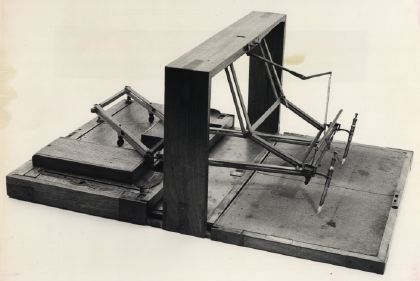
Every aspect--the frame, pens, wires, hinges, springs, writing surface, papers, inks, ink holders--was exhaustively researched and reworked. For example, while struggling to make a pen that would work in the polygraph, Peale wrote Jefferson in detail about materials and designs for pens around the world, and about his own experiments with making them from steel, silver, gold, and platina. Jefferson reported to Peale that he had tried using glass pens in the polygraph, but that he preferred using quill pens in the device (Bedini, l984, p. 62). He willingly tested Peale's continuing experiments with steel pens.
Jefferson was introduced to the polygraph by Peale in l804, early in his second term as president. He continued to use it for twenty years. Extended quotation from his letters to Peale (reproduced in Sellars) in the first year will illustrate his participation in designing it.
April 23 "Your polygraph gave me so much satisfaction that I thought it entirely worthwhile to bestow some time in contriving one entirely suited to my own convenience. It was therefore the subject of my meditations on the road [from Washington], and on my arrival here [at Monticello] I made the drawings which I now send you. I have adopted your idea of having it in the form of a desk to sit on one's writing table, and not that of a box to shut up. I have reduced the size, by getting rid of all useless space, which was chiefly the margins on the outside of the machinery; but as I had not yours present, it is possible the reduction especially in the north and south dimension may be greater than can be admitted without reducing the size of the parallelograms, or the space they work in, neither of which I would venture to do, lest it might injure the action of the machinery, for I well know that hypothesis is one thing and experience another. If therefore I have not given as much field for the parallelograms to move on, as they have in yours, my drawings must be altered in that particular . . . (144).As his last remark suggests, Jefferson's motivation to duplicate important documents ran deep. Selected episodes from his experience suggest why:May 21 [Washington] . . . As soon as the desk is ready I shall be glad to receive it, because, after trial, I shall wish a second and perhaps a third to be sent to Monticello in time to meet me there by the latter end of July. . . The danger of dislocating the machinery by the jolting of the stage will render a conveyance hither by water safest.
PS Would it not be worth while to endeavor to provide a regulator for the degree of tension and resistance which the long wire cord or spiral spring shall give, so as to adapt it to the writer's particular hand, whether strong or weak (146).
August l9 [Monticello] I received two days ago the polygraph lately sent me. It arrived in good order except that the forked spiral spring which suspends the bar with the friction cylinder was broken. In attempting to connect it again by links it broke repeatedly, and tho' I succeeded at last so as to use it, yet is become so short as to perform its function poorly. Perhaps you could send me a new spring. . . the post is but 4 days from Philadelphia here.
On 5 months full trial of the Polygraph with two pens, I can now conscientiously declare it a most precious invention. Its superiority over the copying press is so decided that I have entirely laid aside that. I only lament it had not been invented 30 years sooner. I lament nothing more than the not having been able to preserve copies of my letters during the war. . . " (Sellars,148-149).
When, as a student at the College of William and Mary in the l760s searching out Virginia colonial legal records and statutes in the Public Records Office at Williamsburg, he found many originals to be lost or dissolving in decaying single copies. He transcribed, wrapped, and sewed the surviving statutes in oilcloth to preserve them (Bedini, l984, 2). Later, as a delegate to the second Continental Congress, he copied and circulated his work in progress to collect responses. When the Congress unacceptably altered his draft declaration of independence, Jefferson distributed copies of his original draft in protest. He continued to object to the official Declaration, and to re-issue his version, throughout his life.
Jefferson was determined not only to duplicate but also to archive politically important records. In a British raid on Richmond in l782, Governor Jefferson and the state of Virginia lost many letters and records. He later spent two years on a project to restore some of the record by borrowing and copying letters that were saved.
In l789, one of his first acts as the first United States secretary of state was to purchase for the department a stationary copying press developed by James Watt.
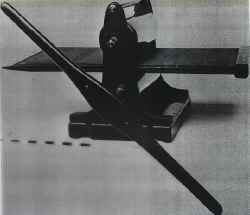
After he had retired from political office in 1809, Jefferson, despite growing physical disability, continued to keep meticulous records including copies of his correspondence (by his count, 1, 267 letters in l820 alone).
Jefferson experimented with every available copying method, except one: he disliked having another person, such as a secretary, copy documents for him. Until 1784, he hand-copied all his documents himself, with exceptions only when he was unable, as when his wrist was broken. By 1785, as minister to France, he was using Watt's desktop and portable copying presses, and urging his friends and associates in government to use them. In l804, as president, he began to use the polygraph, which he enthusiastically promoted from then on.
Why did Jefferson copy so tirelessly, himself, and so dedicatedly cooperate to mechanize the copying process? Interpreters have offered a host of possible reasons--a preoccupation with record-keeping, obsession with systematization, unusual personal discipline; a historic sense sharpened by traumatic losses due to rot, fire, and war; a scientific aesthetic valuing precision, accuracy, principles of mechanics, and gadgets; a proprietary commitment to preserving personal documents; a philosophical commitment to creating political archives. I think that Jefferson's copying was a practical application of his politics. Copying implements democratic self-government. How it does so is my next topic.
Tooling Democracy
Memory and institutional accountability
Copying preserves information. Preservation is essential because democracy, for Jefferson, is generational. Succeeding generations living in changed circumstances from those of their parents must necessarily recreate government, according to Jefferson's plan. Himself having helped to abolish one system of government and establish another, Jefferson well understood the struggle in institutional politics between remembering and forgetting. He was determined to keep the present aware of the past.
"Time and accident are committing daily havoc on the originals deposited in our public offices," he wrote in l791. "The late war has done the work of centuries in this business. The last cannot be recovered; but let us save what remains; not by vaults and locks which fence them from the public eye and use, in consigning them to the waste of time, but by such a multiplication of copies, as shall place them beyond the reach of accident" (Bedini, l984, 3).Decentralization
Mechanized copying distributes political power. As Jefferson hoped to institute it in America, democratic government was to operate at four levels: wards, counties, states, and a national federation of states. Deliberative action by citizens required their informed consent at all levels. For informed consent at any level, people needed to know what had been said or done elsewhere. As the nation expanded, communities became more distant geographically. Mechanized copying eased and speeded the dissemination of information.
Dissent
Mechanized copying facilitates dissent. When Jefferson circulated hand-copies of his draft declaration of independence, he was dissenting from the dominant discourse. But he was limited to the number of copies he could make by hand. Mechanized copying would have aided his dissent.
Most fundamentally, mechanized copying facilitates society, or the natural human condition in Jeffersonian thinking. The 'natural' permeated Jefferson's political philosophy, perhaps as a reflection of his intellectual era. Some interpretations of Jefferson see him as deeply sharing his era's scientific aesthetic. In that aesthetic, mechanics reflected natural order. Machines emulated the beauty of the Newtonian universe by their precise regularity and interdependently working parts. The Newtonian universe was nature and human society was part of it. "To invent was, first of all, to find " (Wills, l978; p. 364). "You can only find what is already there. The highest art is copying. . . Each new gadget just re-exemplifies the great Newtonian laws. In that sense, all 'curious' mechanisms are . . . working models of laws that make us work" (Wills, 1978, 365).
Literally so, if the mechanism is a copier. For Jefferson, the polygraph exemplified the natural human condition, one-to-manyness. By the action of connected writing pens, a writer mechanically creates an original document for individual purposes and simultaneously makes a copy for consideration and use by others, present or future, known or unknown. The polygraph, thus, was a working model of society on which political, deliberative community depends.
Conclusion
I hear echoes of Jefferson's optimism in Vannevar Bush's, and Douglas Englebart's, and Ted Nelson's vision of computing (Bush, l945; Englebart,1968; Nelson, 1984) They are toolmakers who share a social vision of technology as augmenting human ability by making collective human knowledge available to anyone, many-to-one.
This optimism fades in the composition teaching community's discourse about computing, however, when postmodernist poststructuralism enters. Then, a pessimistic vision of computers as instruments of social control takes over. Mark Poster, for example, urges us to analyze all methods of preserving and transmitting information "from cave paintings and clay tablets to computer databases," but especially computer databases, in order to recognize how they extend the power of empire or the state (1990, 7). Poster's perspective, like George Orwell's earlier, is marred by technological determinism. Implicitly in Poster's and Orwell's views, technology acts on people. Technology, in this formulation, defines the user.
Not necessarily, Jefferson-the-hacker would say. The historical Thomas Jefferson, of course, lived before the development of big government, big business, or Big Brother. Nonetheless, he knew and reacted against oppression by real institutions of state, empire, and church in his time. His idea of political democracy--decentralized self-government--fundamentally opposed control over individuals by any form of central power. I have argued here that his radical faith in humanity's ability to govern itself and to alter institutions led him to recognize corollary needs for education, for literacy, and for information technologies. Jefferson thus saw mechanized writing as instrumental to a social compact, not social control. For Jefferson, technology, like government, is what people in community do with it (Kemp, l993). Users, in this formulation, define the technology.
